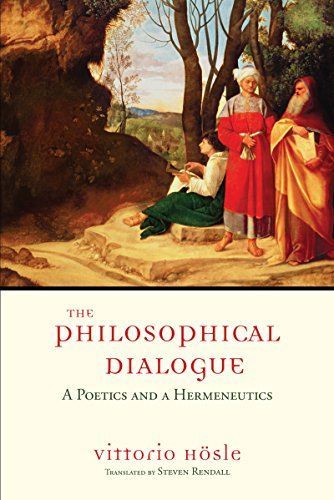
The Philosophical Dialogue A Poetics and a Hermeneutics
No overall history of the philosophical dialogue has appeared since Rudolf Hirzel's two-volume study was published in 1895. In The Philosophical Dialogue: A Poetics and a Hermeneutics, Vittorio Hösle covers the development of the genre from its beginning with Plato to the late twentieth-century work of Iris Murdoch and Paul Feyerabend. Hösle presents a taxonomy and a doctrine of categories for the complex literary genre of the philosophical dialogue, focusing on the poetical laws that structure the genre, and develops hermeneutical rules for its correct interpretation. Following an introduction that employs the categories of subjectivity and intersubjectivity to classify philosophy's modes of expression, Hösle's book is structured by the classical triad of the production, inner structure, and reception of the literary dialogue. To explain what is meant by "philosophical dialogue," Hösle first deals with the specific traits of philosophical dialogue in contrast to other literary forms of philosophy and its special status among them. Second, he distinguishes the philosophical dialogue as a literary genre from actual philosophical conversation, and as a philosophical literary genre from nonphilosophical literary dialogues. Finally, he takes up the connection between literary form and philosophical content in the philosophical dialogue. Numerous authors of dialogues are discussed, with a special focus on Plato, Cicero, Augustine, Hume, and Diderot. Originally published in Germany as Der philosophische Dialog: Eine Poetik und Hermeneutik (2006), this book not only contributes to the philosophical discussion of dialogue but to a great extent defines it. This fine translation will prove useful to both philosophers and literary critics in the English-speaking world. "With its exceptionally clear and powerful argumentation, the book might become the defining work for the study of dialogue. Paraphrasing Kant, one could say that in philosophy mere theory without a history is empty, while history without a theory is blind. Yet in his work Hösle achieves a unique synthesis of historical perceptivity and systematic rigor. This book will be read for many years to come." —Dmitri Nikulin, New School for Social Research